Des fédéralistes européens financés par des chefs de l’espionnage américain
Ambrose Evans-Pritchard – Bruxelles
Daily Telegraph, le 19 septembre 2000
 Des documents déclassifiés du gouvernement américain montrent que la communauté du renseignement des États-Unis a mené une campagne dans les années 1950 et 1960 pour favoriser l’unification de l’Europe. Celle-ci finança et dirigea le Mouvement fédéraliste européen.
Des documents déclassifiés du gouvernement américain montrent que la communauté du renseignement des États-Unis a mené une campagne dans les années 1950 et 1960 pour favoriser l’unification de l’Europe. Celle-ci finança et dirigea le Mouvement fédéraliste européen.
Les documents confirment des soupçons émis à l’époque : en coulisse, l’Amérique travaillait avec acharnement à pousser la Grande-Bretagne à s’intégrer à un État européen. Un memorandum, daté du 26 juillet 1950, donne des instructions pour une campagne visant à promouvoir un véritable parlement européen. Il est signé par le Général William J. Donovan, chef du Bureau américain des services stratégiques en temps de guerre (OSS), l’ancêtre de la CIA.
Certains de ces documents, découverts par Joshua Paul, chercheur à l’Université de Georgetown à Washington, avaient été mis à disposition par les Archives nationales américaines. Le principal levier de Washington sur l’ordre du jour européen était le Comité Américain pour une Europe Unie (ACUE : American Committee on United Europe), créé en 1948. Donovan, qui se présentait alors comme un avocat en droit privé, en était le président.
Le vice-président, Allen Dulles, était le directeur de la CIA pendant les années 1950. Le comité comptait parmi ses membres Walter Bedell Smith, le premier directeur de la CIA, ainsi que d’anciennes personnalités et des responsables de l’OSS qui travaillaient par intermittence pour la CIA. Les documents montrent que l’ACUE a financé le Mouvement européen, l’organisation fédéraliste la plus importante d’après-guerre. En 1958, par exemple, l’ACUE a assuré 53,5 % du financement du mouvement.
L’European Youth Campaign, une branche du Mouvement européen, était entièrement financée et contrôlée par Washington. Son directeur belge, le Baron Boel, recevait des versements mensuels sur un compte spécial. Lorsqu’il était à la tête du Mouvement européen, Joseph Retinger, d’origine polonaise, avait essayé de mettre un frein à une telle mainmise et de lever des fonds en Europe ; il fut rapidement réprimandé.
Les dirigeants du Mouvement européen – Retinger, le visionnaire Robert Schuman et l’ancien premier ministre belge, Paul-Henri Spaak – étaient tous traités comme des employés par leurs parrains américains. Le rôle des États-Unis fut tenu secret. L’argent de l’ACUE provenait des fondations Ford et Rockefeller, ainsi que de milieux d’affaires ayant des liens étroits avec le gouvernement américain.
Paul Hoffman, directeur de la Fondation Ford et ex-officier de l’OSS, fut également à la tête de l’ACUE à la fin des années 1950. Le Département d’État y jouait aussi un rôle. Une note émanant de la Direction Europe, datée du 11 juin 1965, conseille au vice-président de la Communauté Économique Européenne, Robert Marjolin, de poursuivre de façon subreptice l’objectif d’une union monétaire.
Elle recommande d’empêcher tout débat jusqu’au moment où « l’adoption de telles propositions serait devenue pratiquement inévitable ».
Traduit de l’anglais par Laurent Dauré.
————————————-
Article original : Euro-federalists financed by US spy chiefs
By Ambrose Evans-Pritchard in Brussels
12:00AM BST 19 Sep 2000
DECLASSIFIED American government documents show that the US intelligence community ran a campaign in the Fifties and Sixties to build momentum for a united Europe. It funded and directed the European federalist movement.
The documents confirm suspicions voiced at the time that America was working aggressively behind the scenes to push Britain into a European state. One memorandum, dated July 26, 1950, gives instructions for a campaign to promote a fully fledged European parliament. It is signed by Gen William J Donovan, head of the American wartime Office of Strategic Services, precursor of the CIA.
The documents were found by Joshua Paul, a researcher at Georgetown University in Washington. They include files released by the US National Archives. Washington’s main tool for shaping the European agenda was the American Committee for a United Europe, created in 1948. The chairman was Donovan, ostensibly a private lawyer by then.
The vice-chairman was Allen Dulles, the CIA director in the Fifties. The board included Walter Bedell Smith, the CIA’s first director, and a roster of ex-OSS figures and officials who moved in and out of the CIA. The documents show that ACUE financed the European Movement, the most important federalist organisation in the post-war years. In 1958, for example, it provided 53.5 per cent of the movement’s funds.
The European Youth Campaign, an arm of the European Movement, was wholly funded and controlled by Washington. The Belgian director, Baron Boel, received monthly payments into a special account. When the head of the European Movement, Polish-born Joseph Retinger, bridled at this degree of American control and tried to raise money in Europe, he was quickly reprimanded.
The leaders of the European Movement – Retinger, the visionary Robert Schuman and the former Belgian prime minister Paul-Henri Spaak – were all treated as hired hands by their American sponsors. The US role was handled as a covert operation. ACUE’s funding came from the Ford and Rockefeller foundations as well as business groups with close ties to the US government.
The head of the Ford Foundation, ex-OSS officer Paul Hoffman, doubled as head of ACUE in the late Fifties. The State Department also played a role. A memo from the European section, dated June 11, 1965, advises the vice-president of the European Economic Community, Robert Marjolin, to pursue monetary union by stealth.
It recommends suppressing debate until the point at which “adoption of such proposals would become virtually inescapable”.


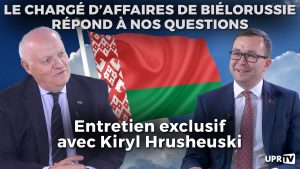
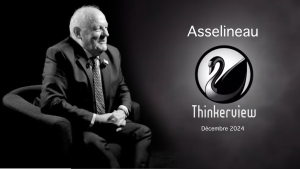
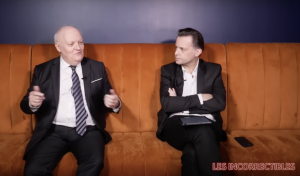
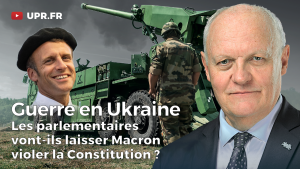
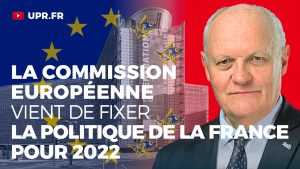

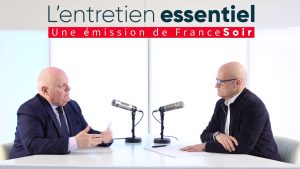
![Que faire pour le 2e tour de l'élection présidentielle ? [2e partie] - François Asselineau](https://www.upr.fr/wp-content/uploads/2022/04/FA_2eTour3-300x169.jpg)
